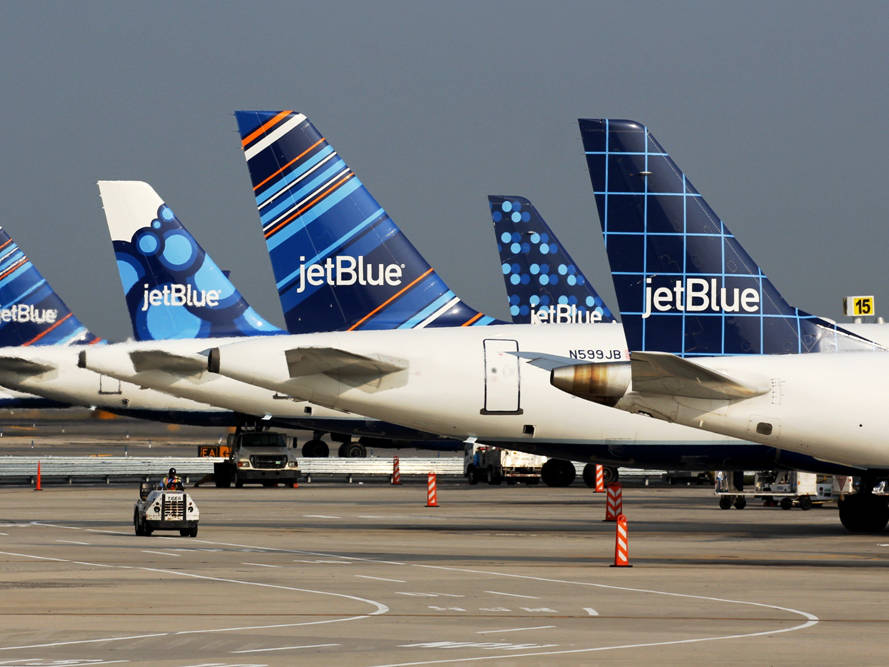Most JetBlue, Spirit Route Cuts Rejected by DOT On Aid Terms
JetBlue Airways Corp. and Spirit Airlines Inc. must continue flying to several dozen destinations they’d sought to shed as the Covid-19 outbreak decimates their business.
The U.S. Department of Transportation on Thursday said it was denying most requests from the two airlines for waivers to rules contained in bailout legislation requiring a minimum level of service for carriers that accept financial assistance.

The department at the same time told Spirit it must resume service to several cities the airline eliminated earlier this week.
Shares of both carriers tumbled, joining an industry-wide sell-off after United Airlines Holdings Inc. said travel demand was “essentially zero” with no sign of near-term improvement. JetBlue was off 5.2%, to $8.71, and Spirit was down 8.5% to $12.60, shortly before the close of New York trading.
Spirit was ordered to resume service to at least 23 locations within seven business days of it receiving the financial assistance, the DOT said in an order. The order granted Spirit’s request to halt flights to Aguadilla, Puerto Rico, and said it would defer a decision about two other locations. The budget carrier had sought exemptions for 26 locations where it had suspended service on April 8.
JetBlue asked to temporarily suspend service to 11 locations. DOT is requiring that it continue flying to nine of those locations, it said in the order.
In a statement, Spirit thanked the department for waiving flight obligations to Rafael Hernandez Airport in Puerto Rico and said the company would comply with the agency’s requirements. JetBlue didn’t immediately respond to a request for comment.
The $2.2 trillion virus stimulus plan empowered the Transportation Department to require airlines to maintain at least some service to locations where they were flying as of March 1, while giving Secretary Elaine Chao leeway to determine how best to employ that authority.
The agency on April 7 spelled out its approach when it set minimum flight requirements for airlines accepting aid from the more than $70 billion for the industry. The plan allows carriers to make major cutbacks to cope with scant demand, while demanding minimum service levels.
Under the department’s plan, an airline that served a city less than five times weekly would need to provide only one weekly flight. For carriers with more than 25 weekly flights, they could trim their flying to five per week.
Thursday’s decisions will be the first of several. The Transportation Department is reviewing additional exemption requests from 11 airlines and will release its decisions on a rolling basis, the agency said in a statement.
Similar Stories
JAS Worldwide signs SPA with International Airfreight Associates B.V.
JAS Worldwide, a global leader in logistics and supply chain solutions, and International Airfreight Associates (IAA) B.V., a prominent provider of comprehensive Air and Ocean freight services headquartered in the…
View Article
LATAM is once again part of the Dow Jones Sustainability Index
View Article
CPaT partners with Wizz Air, Europe’s leading ultra-low-cost airline, to enhance aviation training
View Article
Air Transat takes off to Tulum from Montreal and Quebec City
View Article
Air France KLM Martinair Cargo achieves record online sales and accelerates commercial transformation
View Article[Freightos Weekly Update] Frontloading continues to put pressure on transpacific rates
Transpacific ocean rates increased slightly last week and are about 15% higher than at the start of December as frontloading ahead of expected tariffs is keeping vessels full.
View ArticleGet the most up-to-date trending news!
SubscribeIndustry updates and weekly newsletter direct to your inbox!





